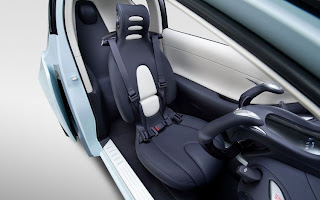More than one attempt has been made in the past to combine the features of an automobile and a motorcycle into one vehicle and now Nissan has thrown their hat into the ring as well with the Land Glider electric vehicle concept.
Inside and out, the Land Glider looks quite similar to Volkswagen’s L1 Concept, but instead of ultimate fuel economy, Nissan was looking for more sporty driving from an electric vehicle. Thanks to a steer-by-wire system and small motors mounted at each wheel, the wheels along with the rest of the vehicle can tilt up to 17 degrees to lean into a corner for sharper handling. Speed, steering angle and yaw sensors work together to determine the appropriate amount of lean for the conditions and the entire system allows Nissan to minimize the width of both the vehicle itself and its tires for maximum efficiency from its battery pack.
Power for the Land Glider “personal city commuter” comes from a lithium-polymer battery pack mounted beneath the floor, which supplies juice for two electric motors mounted in the rear wheels. Together, they can sling the Land Glider down the road at up to 40 mph and take it up to 60 miles on a charge.
Nissan Land Glider Concept Controls
With such small crumple zones, Nissan engineers designed high-tech solutions to keep the Land Glider out of bad situations. A network of sensors on the vehicle monitor other vehicles nearby and keeps the Land Glider from running into them much the same way bees and schools of fish are able to travel in close proximity without bumping into one another.
Like the L1 Concept, passengers in the Land Glider sit tandem with the driver lower and in front. Drive-by-wire controls and video screens in place of mirrors keep the vehicle as narrow as possible to allow two people to zip around city streets and park without taking up much space, both of which are expected to help ease congestion in large cities. While just a concept at this point, the Land Glider’s accident-avoidance and electric-drive technologies are likely to find their way into future Nissan products.
Inside and out, the Land Glider looks quite similar to Volkswagen’s L1 Concept, but instead of ultimate fuel economy, Nissan was looking for more sporty driving from an electric vehicle. Thanks to a steer-by-wire system and small motors mounted at each wheel, the wheels along with the rest of the vehicle can tilt up to 17 degrees to lean into a corner for sharper handling. Speed, steering angle and yaw sensors work together to determine the appropriate amount of lean for the conditions and the entire system allows Nissan to minimize the width of both the vehicle itself and its tires for maximum efficiency from its battery pack.
Power for the Land Glider “personal city commuter” comes from a lithium-polymer battery pack mounted beneath the floor, which supplies juice for two electric motors mounted in the rear wheels. Together, they can sling the Land Glider down the road at up to 40 mph and take it up to 60 miles on a charge.
Nissan Land Glider Concept Controls
With such small crumple zones, Nissan engineers designed high-tech solutions to keep the Land Glider out of bad situations. A network of sensors on the vehicle monitor other vehicles nearby and keeps the Land Glider from running into them much the same way bees and schools of fish are able to travel in close proximity without bumping into one another.
Like the L1 Concept, passengers in the Land Glider sit tandem with the driver lower and in front. Drive-by-wire controls and video screens in place of mirrors keep the vehicle as narrow as possible to allow two people to zip around city streets and park without taking up much space, both of which are expected to help ease congestion in large cities. While just a concept at this point, the Land Glider’s accident-avoidance and electric-drive technologies are likely to find their way into future Nissan products.
 |
| Nissan Land Glider Concept |
Nissan Land Glider Concept
Nissan Land Glider Concept
Nissan Land Glider Concept





















